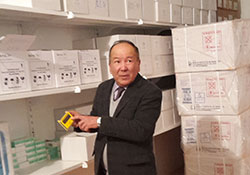Kyrgyzstan initiates mass vaccination campaign as measles cases continue to soar

In response to a large-scale measles outbreak, Kyrgyzstan will initiate a mass measles vaccination campaign on 16 March 2015, targeting over 2 million people aged 1–20 years in the country. The outbreak, which began in early 2014, has caused over 11 300 suspected cases to date and continues to increase by 120–250 suspected cases every day.
The first phase of the campaign focuses on 7–20-year-olds in the capital city of Bishkek and in Chui Oblast, which are the age group and areas most affected. The second phase, planned for April–May 2015, will target children under 7 years of age in these areas and children and adolescents under 20 years of age in the rest of Kyrgyzstan.
Support from WHO and UNICEF
After a dramatic increase in daily reported cases in November 2014, the Measles and Rubella Initiative Outbreak Response Fund provided US$ 500 000 for the outbreak response and other emergency needs in Kyrgyzstan. The funds were provided through WHO/Europe to cover the operational costs of the supplementary immunization activities. Another US$ 1.9 million were provided for the bundled vaccine for measles and rubella and US$ 250 000 for communication and social mobilization activities for the outbreak response through the United Nations Children's Fund (UNICEF).
WHO and UNICEF have been providing communication and logistics support to the Government in preparation for the campaign. National spokespersons have been trained by WHO to communicate effectively with the media and health-care workers have received training on how to vaccinate correctly and safely.
Call to action
The outbreak in Kyrgyzstan is one of several ongoing outbreaks in the WHO European Region. The country's decision to initiate the mass immunization campaign comes in the wake of a call on 25 February 2015 by WHO Regional Director for Europe Zsuzsanna Jakab for policy-makers, health-care workers and parents to immediately step up vaccination against measles across age groups at risk to stop the outbreaks.
Serious threat to Region-wide elimination
Measles is one of the most readily transmitted communicable diseases and among the most deadly of all childhood rash/fever illnesses. However, it can be prevented with safe, effective and inexpensive vaccines.
All 53 Member Countries of the WHO European Region include the measles vaccine in their routine immunization schedules. In 2010, they unanimously committed to eliminating measles and rubella by the end of 2015. The current resurgence in cases points to persistent gaps in immunization coverage at the subnational level that must be addressed in order for the Region to achieve this target.



